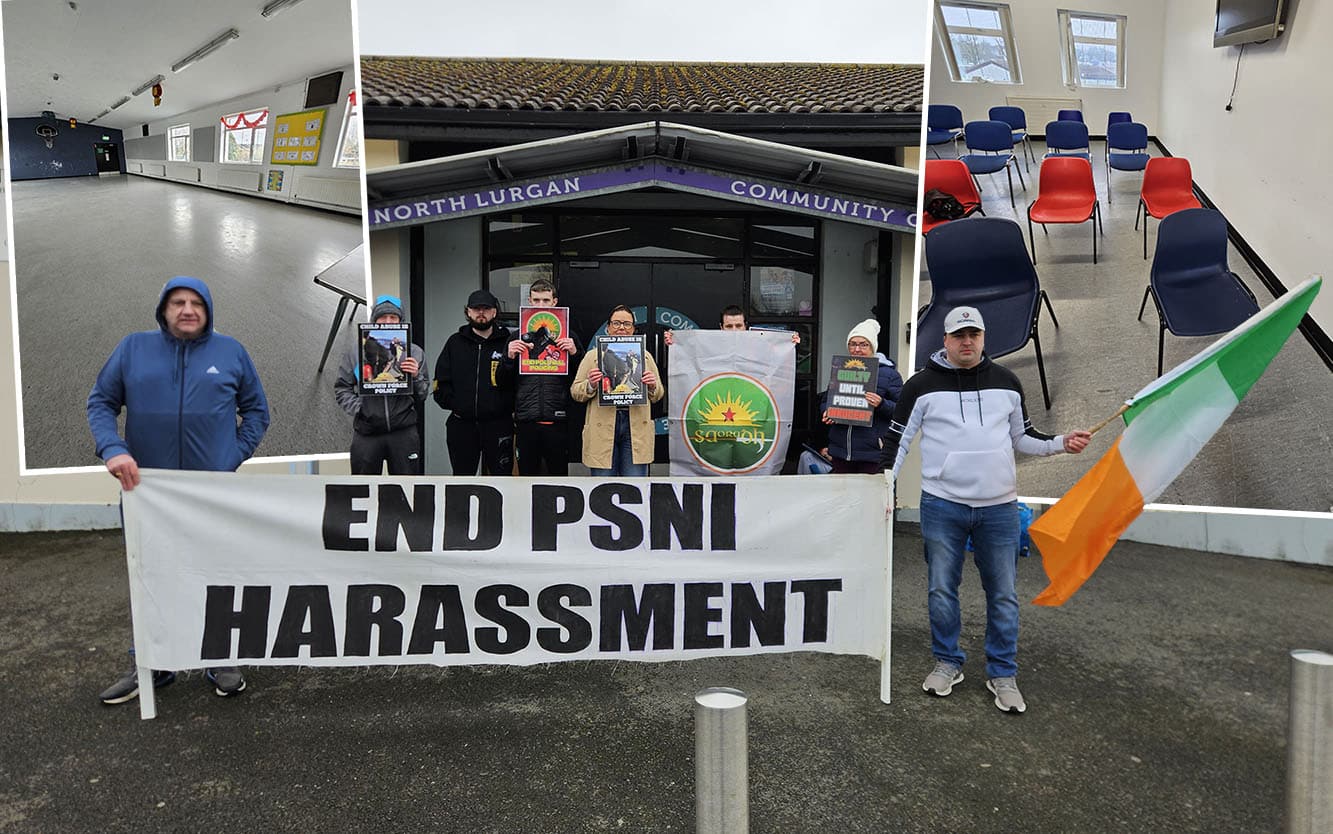
A protest was held by republican group, Saoradh, outside a community policing meeting in Lurgan earlier today (Tuesday).
The meeting was held at the North Lurgan community centre on the Levin Road, however, was disrupted by the protest.
A spokesperson for the group said it took “decisive action” against what it described as a PSNI “stunt” in the Kilwilkee estate.
“Saoradh entered the meeting with a view to disrupt it and found that it was empty with not a single member of the public in attendance, smashing the myth that this force has support in Republican communities,” said the spokesperson.
They added: “Today, we sent a clear message: The normalisation of the British forces of occupation will not go unopposed. And let there be no doubt—this is only the beginning.
“We ensured that this normalisation stunt didn’t go unopposed and we pledge to target future events in a radical and robust manner. We will choose our time and place as it suits but mark our words this isn’t the last time we will take to the streets to oppose the imperialist Crown Forces.”
In response, a police spokesperson said: “Police attended a report of a protest in the Levin Road area of Lurgan this afternoon, Tuesday, February 18. The protest passed without incident.”
Meanwhile, Irish Socialist Republican organisation, Lasair Dhearg, said they were responsible for the erection of anti-PSNI posters in Kilwilke.
Lasair Dhearg spokesperson Pádraic MacCoitir said: “The PSNI have a clear and deliberate propaganda strategy, publicly disseminated, the aims and objectives of which are to sell the force to the ‘Catholic, Nationalist and Republican’ community.
“That strategy seeks to use local resources including community centres, youth spaces, education facilities and more, to make the PSNI seem ‘normal’, in what is essentially a massive public relations exercise.”
Mr MacCoitir added: “That is why in advance of the planned meetings, our Lurgan activists erected posters in the local area, many of which cited the PSNI’s own statistics, including the fact that the PSNI has arrested and charged twice as many ‘Catholics’ than ‘Protestants’ in the last five years.
“Additionally, over the last decade, the PSNI has forcibly stopped and searched over 370,000 people – the equivalent of one fifth of the population of the state. These statistics are available on the PSNI’s own website.
“These posters are not designed to intimidate, but to show those in our community who might be swayed by the PSNI’s strategy, that the force, rebranded from the RUC, remains unchanged in the decades since this strategy was implemented.
“Recent statistics highlighting the lack of PSNI applicants within the Catholic, Nationalist and Republican community, clearly shows the levels of mistrust that that community has of the force. It has put on display for all to see that the ‘Catholic, Nationalist and Republican community’ reject the PSNI, and that they know that involvement with it means only one thing, ostracisation from family, friends and community. It has also laid bare the abject failure of the PSNI’s hearts and minds strategy.”
Police say they are aware of a number of “inappropriate and unacceptable” posters featuring their advertising material being erected in Lurgan.
Superintendent Brendan Green, District Commander of Armagh Banbridge and Craigavon, said: “We engage with all members of the community on local policing priorities and issues that affect them.
“We will continue to use our outreach activities, like those hosted this week in north and south Lurgan, to encourage people from all communities, particularly those currently under-represented within the Service, to apply for a career in policing.”
Meanwhile, the PSNI’s latest recruitment drive for Student Officers, which launched on Wednesday,January 22 and closed on Wednesday, February 12, attracted a total of 4,822 applications.
The Call Handler competition which launched on Monday, January 27 and closed on Monday, February 17 attracted 587 applicants seeking to pursue a career in policing.
Deputy Chief Constable Bobby Singleton said: “It is really positive to see that in the three week application window such a large number of people have expressed an interest in stepping up to serve our communities and keep people safe by becoming a police officer or call handler with the Police Service of Northern Ireland.
“Whilst applications are slightly down for student officers on the previous campaign, they have risen for the call handler position.
“We were conscious that we would be operating in very competitive job market, with the Northern Ireland unemployment rate at a record low of just 1.9%. A recent report by the Ulster University’s Economic Policy Centre also highlighted a shortage of 5,440 workers a year, resulting in an undersupply of available workers across almost all sectors and industries.
“In this context, the police service was competing against a whole variety of other professions and we recognised that this will of course impact on the numbers seeking employment with us as police officers. We are also aware that this is being felt across many sectors, including the other blue light services.
“Throughout the recruitment campaigns, in addition to advertising across traditional social and digital media, we also held a number of outreach and engagement events across Northern Ireland to meet and interact with people who wanted to know about a career in policing.
“We met with so many brilliant and dedicated people from all backgrounds and walks of life whose talents will undoubtedly enhance our Police Service and improve the lives of the communities we serve.
“Being a police officer is not the career for everyone, but for those of us for whom it is truly a vocation, it is an exciting, challenging and varied one where you can literally change lives for the better because of the positive difference you make for people and communities.
“Each of the student officer applicants has now started their journey through a rigorous but worthwhile process, which has been developed to ensure that the very best candidates will go forward to be offered a place on the training programme.
“If this time you did not apply, but are still thinking about a career in policing, please come and talk to us about future opportunities.”





